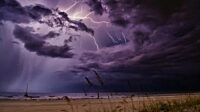Blackout – definition & measures
Blackout is a term that has been used repeatedly in the media for many years now. But what exactly is meant by “blackout” and how is the term defined? Here is the German government’s definition of a blackout:
"A supply failure, also known as a “blackout”, is a large-scale power failure. It affects a large number of people at the same time." Source: German government
1.666 alarms per second
safeREACH as your powerful emergency notification system with up to 100.000 alarms per minute. Successfully used by multinational corporations, medium-sized companies and public authorities. ISO-certified server infrastructure.

The power grid is considered critical infrastructure and, as we know, electricity is irreplaceable in most areas. However, if the power grid becomes unbalanced, a large-scale power outage can occur. If this outage only lasts for a short time, i.e. a few minutes or hours, it is not a major problem. However, longer periods without power can cause major problems for companies, municipalities, states and the federal government. In this case, we speak of a blackout.
How high is the blackout risk?
The real threat of a blackout is difficult for outsiders to assess. What is certain, however, is that the climate crisis is leading to an ever-increasing number of extreme weather events and the resulting emergency alerts. Heavy rainfall or snowfall, storms or other extreme weather conditions that can damage areas of power generation may lead to long-lasting power outages.

Thunderstorms can lead to a blackout
Another risk is a sudden sharp increase in electricity consumption, which destabilises the balance of the grid. This could occur, for example, if the population suddenly changes its energy source for heating and electric fan heaters are used instead of the widespread gas heaters.
In the course of the Ukraine crisis, this was repeatedly a hotly debated topic. In any case, there was no blackout in Europe in the winter of 2022/23. A long-lasting power outage is still considered very unlikely, but cannot be ruled out completely. For this reason, it is important to prepare for this scenario and prepare an alarm system in case of an emergency.
More information on the possible causes of a blackout can be found in the article linked here.
Over 20 years of experience in alerting
IT alerting, fire alarms, alerting company first responders and much more. ISO-certified server infrastructure. Used by SMEs, corporations, authorities and public organisations.

Possible measures for dealing with long-lasting power outages
Storms, wars, cybercrime or major fluctuations in the power grid can lead to a blackout, for which companies should be prepared. The reality, however, is that many are not and the risk of millions in losses is high.
But what can companies do in specific terms? What measures need to be taken to protect the company and its employees in the event of a long-lasting power outage?
This is what long-term preparation for a blackout looks like:
- Emergency plan on paper and appointment of a crisis team
- Define emergency operations and communication channels (e.g. satellite phones)
- Ensure primary care for employee
It is also important to react correctly in the situation that arises. These are the immediate measures to take in the event of a blackout:
- Trigger an alarm to the responsible persons, for example by text message or phone call
- Operational logging of the blackout
- Securing access, gate and alarm systems
- Use of emergency power generators
- Shut down critical processes to enable safe start-up later on
- If necessary: rescuing people in emergencies
If an end to the blackout is foreseeable, it is important to prepare for the start-up of all systems in an organised manner. Orderly commissioning makes it possible to switch to regular operation without any damage. Conscientious documentation of the processes is also of great importance in order to be able to immediately identify and rectify any sources of error.
1.666 alarms per second
safeREACH as your powerful emergency notification system with up to 100.000 alarms per minute. Successfully used by multinational corporations, medium-sized companies and public authorities. ISO-certified server infrastructure.
